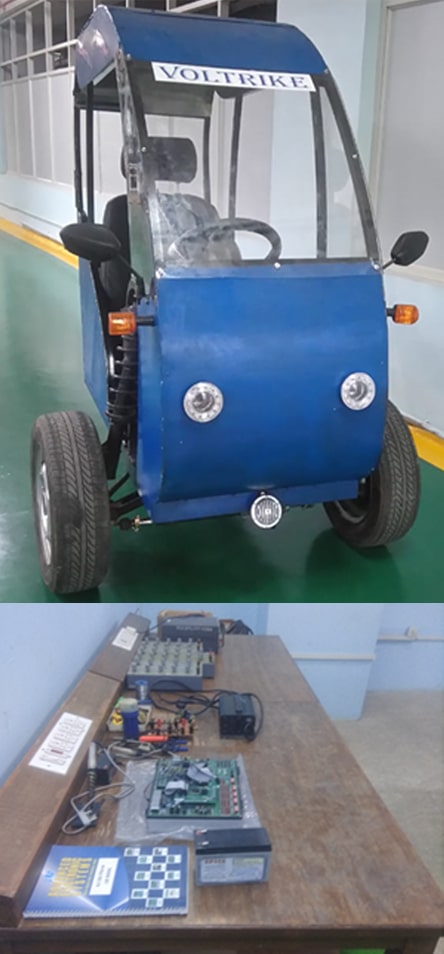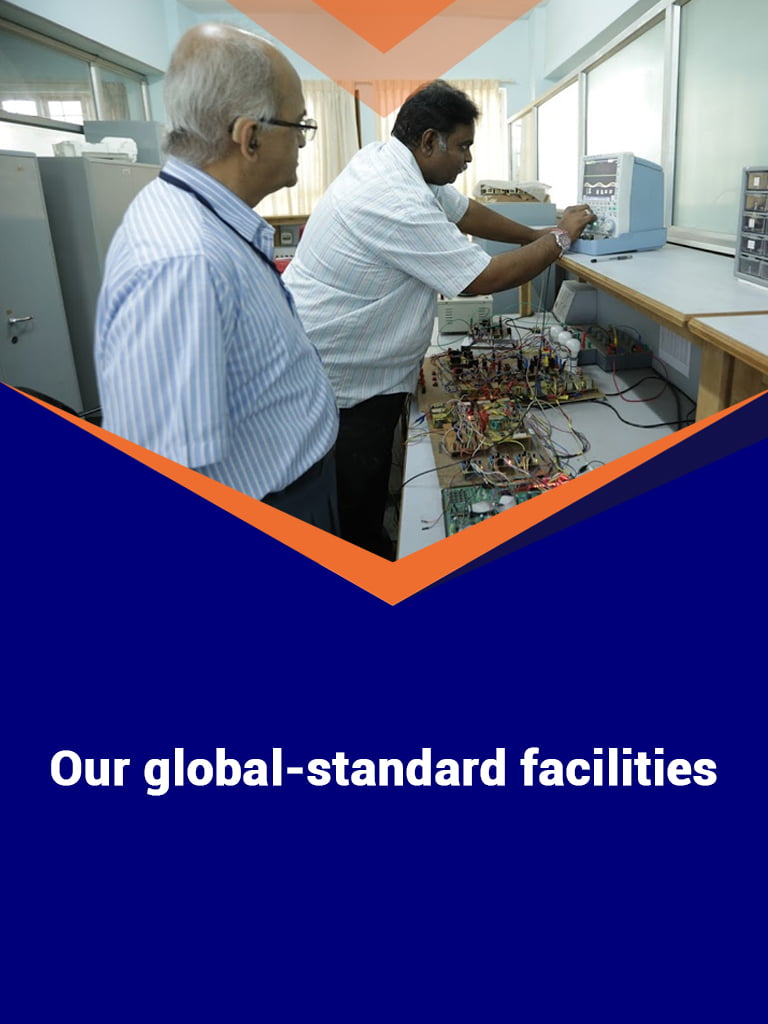LABORATORY INFORMATION
The department is well equipped with the required facilities for conduction of experiments and pursuing research work. More emphasis is being given to the effective, elaborate, and rigorous laboratory classes to reinforce the theoretical knowledge gained during theory classes. Students are divided into small groups to give them proper exposure. At present, the following laboratories have been established in the department.
| SI.No. | PARTICULARS |
| 1 | Research and development Laboratory |
| 2 | Basic Electrical Engineering Laboratory |
| 3 | Electrical Machines Laboratory |
| 4 | Electronics Laboratory |
| 5 | OP-AMPs and Linear ICs Laboratory |
| 6 | Microcontroller Laboratory |
| 7 | Power Electronics Laboratory |
| 8 | Control System Laboratory |
| 9 | Digital Signal Processing Laboratory |
| 10 | Power System Simulation Laboratory |
| 11 | Relay and High Voltage Laboratory |
1. Research & Development laboratory

2. Basic Electrical Engineering Laboratory

3. Electrical Machines Laboratory-I & II

4. Electronics Laboratory

5. OP-AMPs and Linear ICs Laboratory

6. Microcontroller Laboratory

7. Power Electronics Laboratory

8. Control System Laboratory

9. Digital Signal Processing Laboratory

Digital signal processing laboratory course helps the students to understand, analyse and design the techniques that provide the core knowledge as required for any DSP engineers. The laboratory has Licensed MATLAB software with many Toolboxes under Simulink platform. Students can simulate experiments in MATLAB.
Programming of the DSP chip is done in C language using the Code Composer Studio integrated development environment. The laboratory also aims at supporting the teaching and research activities in DSP.
10. Power System Simulation Laboratory

11. Relay and High Voltage Laboratory

High Voltage laboratory course is one of the established laboratories of Electrical & Electronics Engineering Department with a maximum voltage capacity of 100kV.The laboratory is equipped with various relays and high voltage equipment’s that familiarizes the principles of HV generation and measurements.
The facilities of the laboratory can be extensively utilized in research and development work in the areas of breakdown phenomenon in insulating media, withstand voltage in different types of air gaps, surface flashover studies on equipment and also electrical interference studies due to discharges from the equipment operating on high voltages. It also provides test facilities for testing high voltage equipment as per various international standards to electric utilities and industries.
Facilities: AC/DC HV Test set with Control Panel, Cascaded Transformer Unit, Spherical / Rod / Plate Gap Apparatus, Earth Tester, Oil Test Setup.
12. Electric vehicle Laboratory

The automobile industry has been shifting at a faster phase towards electric vehicle domain. There is a rising demand in the industry for efficient and skilled manpower in order to implement higher end technology in electric vehicle system.
Department of EEE has established Electric Vehicle Laboratory (EVL) to provide practical learning platform in EV technology and develop industry ready manpower. The EVL is designed to provide internship and skill development programs for third and final year students of EEE, ECE and mechanical stream. It has the following equipment to train students at higher end technology in EV domain
- EV three wheel prototype
- Control systems such as
- Microcontrollers
- Field programmable gate array kit
- Battery pack development platform
- Lithium battery and Battery management system modular setup
- Regulated power supply
- Soldering station (spot welding)
- Power Quality analyzer
- Digital storage oscilloscope
- Sensors, electronic tools and consumables
- Measuring devices
DEPARTMENT LIBRARY
In addition to the central library, a Library is functioning in the department for staff and students, which includes reference books, seminar, and project reports.
- Details of Books in Department Library
| SL.NO. | PARTICULARS | TOTAL |
| 1 | Books in Issue Section | 587 |
| 2 | Books in Reference Section | 164 |
| 3 | Non-Technical Books | 21 |
| Total | 772 | |
DIGITAL CLASSROOMS
| The department has two well equipped audio-visual classrooms consisting of a computer with LCD projectors and one smart classroom. |
Research Facilities developed/created for carrying out research work in the department of EEE
| Sl. No. | Name of Facility | Description of Facility |
| 1 | Inclined Plain Tracking and Erosion Tester | Up to 6 kV, as per ASTM D2303, IEC 60587 |
| 2 | Flash and Fire Point Meter | Up to 250° C, ASTM D3278 |
| 3 | Viscosity Measurement Kit | as per ASTM D3238, ASTM D445 |
| 4 | Magnetic Stirrer | 1 liter capacity |
| 5 | Distance Relay with Injection Test Kit | Multiple current and phase voltagemeasurements to measure impedance |
| 6 | Negative Sequence Relay with Test Kit | 1A / 5A, 50 Hz, 250V AC |
| 7 | Numerical Directional / Non- Directional Overcurrent Relay | 5A or 1A current rating, 9.5 secs / 2.5 secs |
| 8 | DIgSILENT Power factory | Load Flow Analysis, Short-Circuit Analysis, Load Flow Sensitivities, Basic MV/LV Network Analysis, Relay coordination, Transient Stability, Optimal Power Flow |
| 9 | PLC HMI KIT | PLC-Siemens & Human machine interface with auxiliary devices |
| 10 | Power Quality Analyzer | HIOKI PW3198 With voltage and current probes [single phase and three phase]. For harmonic analysis of electrical and electronic circuits. |
| 11 | Digital Storage Oscilloscope | YOKOGAWA DLM 2022 DSO, 200MHz Measurement of high frequency signals. and storage of data for further analysis |
| 12 | FPGA KIT | FPGA KIT Spartan-620MHz All kinds of Symmetrical & a-symmetrical PWM pulses can be generated to trigger the solid state switches of power electronics converter |
| 13 | MATLAB | MATLAB-2018a, Campus Unlimited License Version To simulate all Electrical circuits, Power electronic converter & Power system modules for analysis and future hardware implementation |
| 14 | Fractional HP Three phase Induction Motor with Mechanical Loading | 415 V, 0.5A, ¼ HP, 50 Hz To conduct projects on speed control of Induction Motor using power electronic converter circuits |
| 15 | Solar Panels 2 Nos. | 1. M/s BEL, 10 Wp, 16.4V 2. Photon Energy Systems, 10 Wp, 17 V For UG & PG Project on Renewable Energy Sources, |



